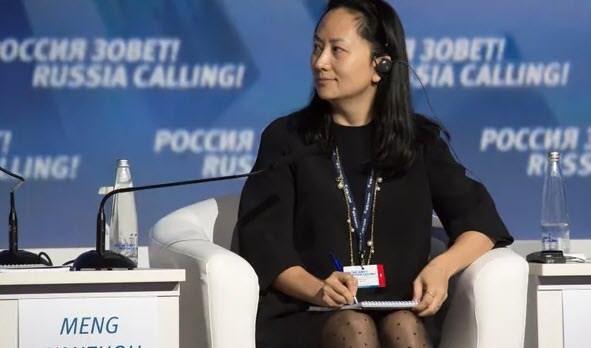Terry Branstad urged to cancel arrest warrant for Meng Wanzhou and end her ‘egregious’ detention
China has summoned the US ambassador in Beijing to protest about the detention of a senior Huawei executive in Canada after US law enforcement officials issued a warrant for her arrest last week.
The official Xinhua news agency said the vice-foreign minister, Le Yucheng, had “lodged solemn representations and strong protests” with the ambassador, Terry Branstad, against the detention of Meng Wanzhou, chief financial officer of the Chinese technology firm.
Meng was detained last week while changing planes in Vancouver, Canada, with prosecutors saying she had committed fraud by lying about links between Huawei and a shell company used to sell telecommunications equipment to Iran in breach of US sanctions.
The Xinhua report quoted Le as calling Meng’s detention “extremely egregious”, demanding the US cancel the order for her arrest and saying China would take further steps based on Washington’s response.
In a court filing on Sunday, Meng argued that she should be let out on bail while awaiting an extradition hearing due to severe hypertension and fears for her health while incarcerated in Canada.
In a sworn affidavit, she said she is innocent of the allegations and will contest them at trial in the United States if she is surrendered there. Meng also said she was taken to a hospital for treatment for hypertension after being detained.
In a bail application seeking her release pending an extradition hearing, Meng said she has longstanding ties to Vancouver dating back at least 15 years, as well as significant property holdings in the city.
The statement came after the summoning of the Canadian ambassador, John McCallum, on Saturday over Meng’s detention and a similar protest warning of “grave consequences” if she were not released.
Huawei is the biggest global supplier of network equipment for phone and internet companies and has been the target of deepening US security concerns over its ties to the Chinese government. The US has pressured European countries and other allies to limit use of its technology, warning that they could be opening themselves up to surveillance and theft of information.
Meng is the daughter of the company’s founder and a former officer in the Chinese military. She faces extradition to the US over the reported sanctions violations.
Her case threatens to derail a fragile truce in a trade war between the US and China. The US president, Donald Trump, and Chinese president, Xi Jinping, had agreed to give their negotiators 90 days to resolve trade disputes between the two countries.
On Sunday, the US trade representative, Robert Lighthizer, told CBS’s Face the Nation: “As far as I am concerned it is a hard deadline. When I talk to the president of the United States he is not talking about going beyond March … The way this is set up is that at the end of 90 days, these tariffs will be raised.”
After a turbulent spell for the markets last week, Lighthizer added that investors “can be reassured that if there is a deal that can be made that will assure the protection of US technology … and get additional market access … the president wants us to do it. If not we will have tariffs.”
In Argentina last weekend, Trump and Xi agreed to a truce that delayed a planned 1 January hike in tariffs on $200bn (£157bn) of Chinese goods while they negotiated a trade deal.
By Simon Goodley
![]()






























